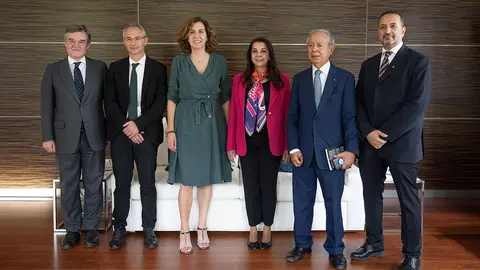The University of Salamanca hosts the first Morocco Chair in Spain

The University of Salamanca (USAL) has become the headquarters of the first Chair of Morocco in Spain, whose aim will be to reflect on, analyse, research and strengthen the ties existing between the two countries, not only from a historical point of view, but also in the present and the future. This was made clear during the presentation at Casa Árabe of this Chair, directed by Rachid El Hour, Professor of Arab and Islamic Studies.
The event was opened by the Director General of Casa Árabe, Irene Lozano, who, after welcoming the audience, stressed the importance of this initiative "which reflects the years of collaboration and joint work in Spanish-Moroccan relations", and recalled that the University of Salamanca was already a pioneer in creating a Chair of Arabic in 1381, in which Arabic, Hebrew and Chaldean were taught. "For Casa Árabe, acts such as these give us the reason for our existence," said Lozano, before wishing "success for the brilliant future of the Chair of Morocco".
The rector of the USAL, Ricardo Rivero Ortega, "expressed his gratitude for making this dream possible", which seeks to "strengthen ties". He recalled that the oldest university in the world is in Fez: the University of Al-Qarawiyyin, recognised by UNESCO and founded by a woman, "which breaks any cliché of where knowledge is born and what the deepest roots are"; and that it was the Arab world that preserved classical thought in the Middle Ages and allowed the rediscovery of Aristotle. In Salamanca, he added, the first grammar of the language was written, which is full of Arabic terms.

The recovery of common cultural roots will be, stressed the rector of the USAL, one of the objectives of this Chair. "Recovering that history of civilisation that is revealed by the oral memory of holy and supportive women in Morocco several centuries ago and recognised as the architects of their communities", but also the present and future of a country that he described as "an influential power on a cultural level", and essential in the development of Africa. "A future that Spain must not fail to look to because of the ties that unite us", the Rector affirmed.
Finally, he advocated the participation of the universities in the common interests between the two countries through the intellectual and academic aspect (books, congresses, seminars, research...).

Also expressing gratitude and satisfaction were the words of the Moroccan Ambassador to Spain, Karima Benyaich, who stressed the importance of culture and the "new stage of excellent relations between Morocco and Spain", which were strengthened, she recalled, on 7 April with the visit of the President of the Government at the invitation of the Moroccan King, and with the High Level Meeting which "opened up great prospects" for promoting stability, prosperity and security and contributing to the Moroccan region.
"A new page was opened with a great future," said the ambassador after emphasising that only 14 kilometres separate one country from the other, and highlighting that, along with its millenary history, Morocco is also a modern country on the move, enjoying political stability, legal security and a solid economy, and in which major reforms are being undertaken under the rule of Mohammed VI.

University cooperation
The ambassador also referred to the Joint Declaration adopted at the end of the HLM, especially points 55, 56 and 57, which deal with university cooperation; promoting student mobility; encouraging Spanish universities to open campuses in Morocco; and reciprocal access for university students from both countries.
Spanish universities host more than 20,000 African students, who benefit from 11,000 scholarships, receive 190,000 students from the Moroccan community living in Spain, and some 5,000 Moroccan students choose Spain to continue their university studies, according to data provided by Karima Benyaich.

"Only by investing in the potential of young people will we achieve true well-being and sustainable development between the two peoples", said the ambassador, who concluded by assuring that this Chair will contribute to the rapprochement and strengthening of relations between Spain and Morocco.
The presentation ceremony was also attended by Driss Dahak, member of the Royal Academy of Morocco, who, after praising the creation of the Chair, spoke of his country's deep desire to believe in a new stage of total trust between Morocco and Spain, a trust, he said, that has historical, geographical and cultural roots present in all aspects of life in Spain.

The director of the Chair of Morocco, Rachid El Hout, was very excited and grateful to those who have made this initiative possible, which came from the rector of the University of Salamanca himself. "I am fortunate to work with people who are committed to relations between Spain and Morocco," said the professor proudly, who expressed his confidence that all the factors (globalisation, common sense, history...) will come together to make this Chair a success.
The event was closed by Alberto Ucelay, Director General for the Maghreb, Mediterranean and Middle East at the Ministry of Foreign Affairs, European Union and Cooperation, who emphasised the Ambassador's words regarding the good relations between Spain and Morocco and the issues and interests that unite them, as well as the effort that Spain is making to highlight the value of the common legacy "to present it to humanity as a great promise for the future", hence, he said, the importance of this Chair.










